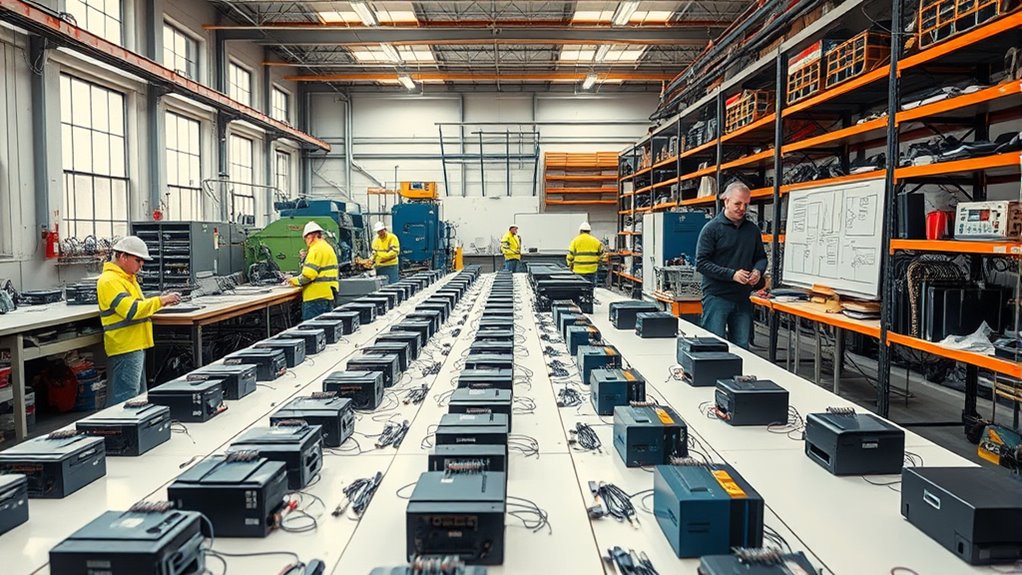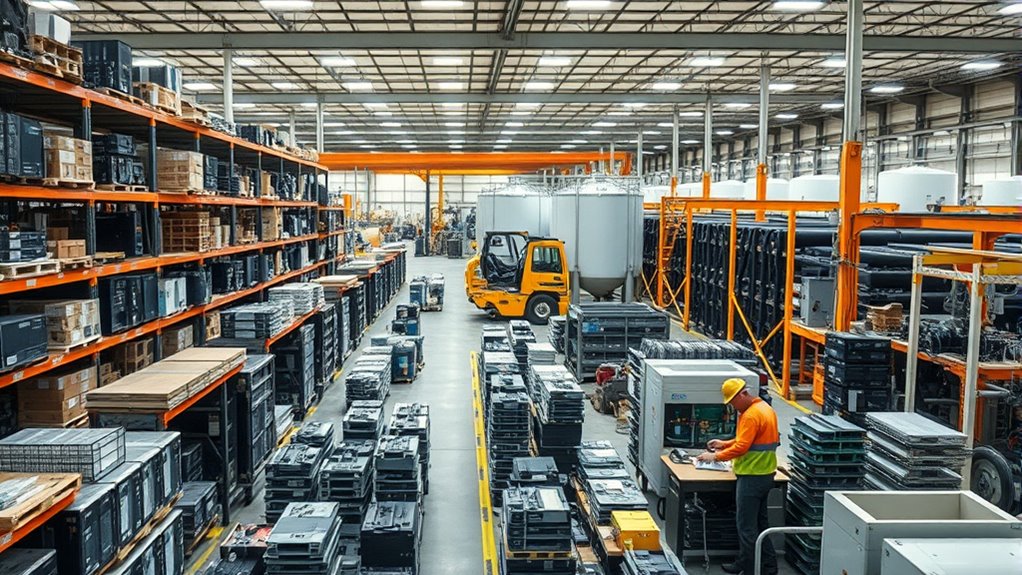Scaling your reconditioning business open new growth opportunities by expanding capacity and attracting more customers. To succeed, you need effective marketing strategies that communicate your value and build trust, along with strong supplier partnerships to keep quality consistent. Challenges may include maintaining standards during rapid growth and managing supply chain disruptions. Focusing on transparent communication and leveraging strategic collaborations can help you sustain success—if you want to explore how to navigate these factors, there’s more to uncover.
Key Takeaways
- Expanding reconditioning services opens new market segments but requires robust marketing to communicate quality and sustainability.
- Maintaining supply chain reliability is crucial to meet increased demand without compromising standards.
- Strategic supplier partnerships can enhance access to quality materials and support scalable operations.
- Effective marketing highlights expanded capabilities and builds customer trust during growth phases.
- Balancing capacity expansion with quality control ensures sustainable growth and customer satisfaction.

Have you ever wondered how companies successfully expand their reconditioning processes without sacrificing quality? The key often lies in leveraging innovative marketing strategies and strengthening supplier partnerships. When scaling up, it’s essential to communicate the value of your reconditioning services effectively. Innovative marketing helps you reach new customer segments and build brand trust, demonstrating that your expanded operations maintain high standards. By highlighting your commitment to quality and sustainability, you can differentiate your business in a competitive market. Digital campaigns, testimonials, and transparent processes all serve to reassure customers that growth doesn’t mean cutting corners. This approach guarantees demand grows alongside your capacity without compromising the integrity of your reconditioning work. Understanding the importance of road signs can also help you navigate new markets and regions more safely and efficiently. Equally important is cultivating strong supplier partnerships. As you scale, maintaining a reliable supply chain becomes vital to meeting increased volume demands. Partnering with trusted suppliers ensures you have access to quality materials and components, which directly impacts your reconditioning standards. These collaborations can also lead to better pricing, priority service, and shared innovations, all of which help you expand smoothly. Building long-term relationships with suppliers allows you to navigate potential supply disruptions and maintain consistency across your reconditioning processes. This stability is vital when scaling, as it helps prevent delays and quality issues that could tarnish your reputation. Innovative marketing and supplier partnerships are interconnected; they work together to support sustainable growth. For example, your marketing efforts can highlight your commitment to working with reputable suppliers, reinforcing customer confidence. At the same time, supplier relationships might enable you to incorporate new materials or techniques that give your reconditioning services a competitive edge. As your reach grows, these partnerships can also open doors for joint ventures or co-branded initiatives that elevate your brand presence. Scaling up reconditioning isn’t just about increasing volume; it’s about doing so smartly. You need to balance expanding capacity with maintaining the quality your customers expect. That’s where innovative marketing and strong supplier relationships come into play. They serve as the foundation for sustainable growth, allowing you to communicate your expanded capabilities effectively and secure the resources needed to uphold your standards. When executed well, these strategies ensure your business can grow without losing sight of what made it successful in the first place. Your ability to adapt, innovate, and collaborate will determine how seamlessly you can scale up while preserving the quality that keeps your customers coming back.
Frequently Asked Questions
What Are the Initial Investment Costs for Scaling Reconditioning Operations?
Your initial investment costs for scaling reconditioning depend on factors like market analysis and supplier partnerships. You’ll need to budget for equipment, facility upgrades, and inventory, which can range from a few thousand to hundreds of thousands of dollars. Establishing strong supplier relationships helps reduce costs and guarantees steady supply. By carefully planning your market analysis, you can identify the right scale and investment level, making your expansion more manageable and profitable.
How Can Businesses Ensure Quality Control During Rapid Expansion?
Oh, sure, just wing it during rapid expansion and hope quality stays perfect! But seriously, you can guarantee quality control by implementing strict process standardization and robust quality assurance protocols. Regular training keeps everyone on the same page, and frequent audits catch issues early. Embracing technology helps monitor consistency, so even when you’re scaling fast, your reconditioning quality remains excellent—no miracles needed, just good practices.
What Are Common Legal or Regulatory Barriers Faced When Scaling?
You often face legal compliance and regulatory hurdles when scaling your business. These barriers include maneuvering complex licensing requirements, adhering to evolving environmental standards, and meeting safety regulations. You need to stay updated on local, state, and federal laws to avoid fines or delays. By proactively working with legal experts and maintaining thorough documentation, you can overcome these challenges and guarantee smooth growth while staying compliant with all regulations.
How to Attract Skilled Labor for Larger Reconditioning Facilities?
Imagine expanding your reconditioning facility, and you need skilled labor. To attract talent, invest in workforce training programs that showcase your commitment to employee growth. Offer competitive wages and benefits, and build relationships with local trade schools or community colleges. Highlight growth opportunities within your business, making it clear that your larger operation provides stability and career advancement, which appeals to skilled labor seeking long-term employment.
What Technological Innovations Can Improve Scalability and Efficiency?
You can improve scalability and efficiency by integrating automation systems to streamline repetitive tasks, reducing labor costs and increasing throughput. Leveraging data analytics allows you to monitor processes in real-time, identify bottlenecks, and optimize workflows. By combining automation integration with data analytics, you’ll make better-informed decisions, enhance productivity, and scale your reconditioning operations smoothly, keeping up with growing demand while maintaining quality standards.
Conclusion
As you scale up reconditioning, remember that 85% of consumers now prefer refurbished products over new ones, highlighting a huge market opportunity. While expanding, you’ll face challenges like maintaining quality and managing costs, but your commitment can turn these into advantages. Embrace the growth, and you could see your business not only thrive financially but also contribute to a more sustainable future. The potential is vast—are you ready to seize it?










